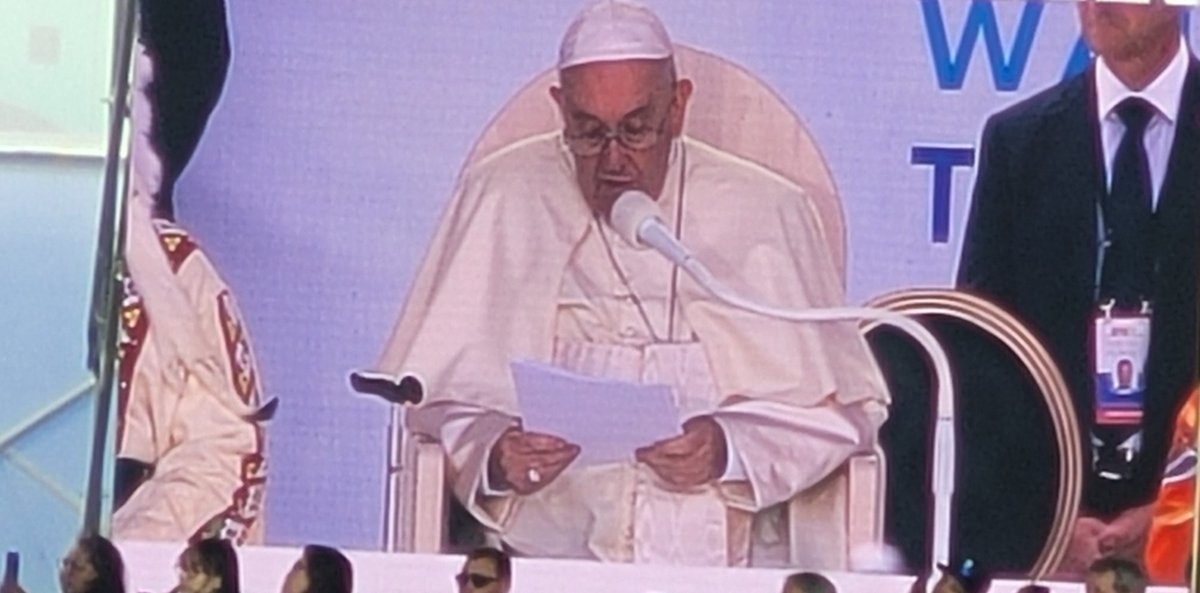Pope Francis spoke the words “I am deeply sorry” on Canadian soil as he addressed survivors and families for the wrongdoings and harms caused by Catholic Church-operated Indian residential schools.

On July 25, 2022, Pope Francis began the papal visit with his first stop in Maskwacis First Nation, Alberta.
During his address, the Pope referred to a pair of baby moccasins presented to him during the Indigenous delegation in Rome, which occurred at the end of March 2022.
“I would like to reflect on this symbol, which over the past few months has kept alive my sense of sorrow, indignation and shame,” said Pope Francis. “The memory of those children are indeed painful. It urges us to work to ensure that every child is treated with love, honour and respect.
“Those moccasins also speak to us of a path to follow, a journey that we desire to make together.”
It was a gesture that came from retired Okanese First Nation Chief Marie-Anne Day-Walker Pelletier to amplify his commitment to visiting Canada, to deliver an apology, and to visit a residential school gravesite.
“I’m feeling relieved that the moccasins have been returned back,” said Day-Walker Pelletier. “The words that he described really put in perspective that he really understood that the unmarked graves and the children that were lost and died he really … (reinforced) the presentation I made in Rome.”
At the end of March, Day-Walker Pelletier presented baby moccasins to Pope Francis to represent the children that were ripped from their families to be placed in Indian residential schools where many did not return home.

Get breaking National news
“It made me feel like he’s a very humble person, very kind and very responsive,” she said. “I watched a lot of survivors and lots of emotions came out, but I think a lot of (them) felt very emotional hearing him apologize.
May Desnomie from the Peepeekisis First Nation is a residential school survivor. She was one of the guest speakers who addressed the Pope prior to his apology. The day was overwhelming for her and she still has not processed everything yet.
“I had a lump in my throat (to think) he has actually come here to apologize to me,” said Desnomie. “I took it personally. Now that he was on Canadian soil, I felt like he was talking and apologizing to me.”
However, not everyone shared the other survivors’ thoughts and feelings. Barry Kennedy, a residential school survivor of the Marieval residential school, did not attend the papal visit but expressed disappointment when he learned the pope was presented a headdress from the former Grand Chief of Treaty Six First Nations and a member of the Truth and Reconciliation Commission, Wilton Littlechild.
“The headdress is very significant in our traditions and culture. They are worn by leaders that we respect and follow,” said Kennedy. “To me, it’s a crying shame to give him a headdress. After he (finishes his visit), it’s going to be the same … nothing is going to change.”
The Alexis Nakota Sioux Nation Chief Tony Alexis said today was a historical moment for Indigenous peoples but that the papal apology reopened old wounds for many residential school survivors.
“People were triggered in the audience … you can hear it and see it. It opened a wound and we can’t leave it like that,” said Chief Alexis. “You can’t just say I’m sorry and walk away…there has to be more to be done.”
The Pope said in his speech the begging pardon is not the end of the matter but is the first step and the starting point.
“An important part of this process will be to conduct a serious investigation into the facts of what took place in the past,” said Pope Francis. “I will continue to encourage the efforts of all Catholics to support the Indigenous peoples … my presence here and the commitment of the Canadian Bishops are a testimony to our will to persevere on this path.”
If you or someone you know is a residential school survivor and is looking for help, you can call the Residential School Survivors and Family Crisis Line at 1-800-721-0066.









Comments